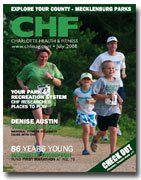 Eating To Run Your Best
Eating To Run Your BestTim Long
With the Corporate Cup Half Marathon taking place here in Charlotte tomorrow morning, I thought I would touch on some of my favorite topics: eating before an event and final preparations before the big day.
Workout the day before the event?
You bet. Some may argue to take off from running the day before a big race. I believe you'll show up to the start line feeling flat with "thick legs". What I do the day before a race depends on the distance of the event. If it's over 30 miles, I don't let my feet touch the ground the day before. Well, maybe just a 15 minute walk, but that's it. For shorter distances, like a half marathon, I'll head out for 5 or 6 miles and do 4 strides where I pick up the pace to get fast leg turnover for 200-400 meters. I'm not fatigued, and I'm keeping my body sharp.
Eating - the night before and on race morning
Eat or drink the wrong thing the night before a race and you'll be in for an unpleasant (to say the least) experience. The key is to not try anything new the night before the event. If your girlfriend wants to try out that new authentic Yemeni restaurant tonight, tell her it's an awesome idea, but how about the night after the race, so you can relax and enjoy more quality time with her. You just killed two birds: made your girl feel special and saved yourself from memorizing the inside of a porta-pottie.
Pre-race dinners should be, as already pointed out, familiar, comprised mostly (75%) of complex carbohydrates for energy, and a reasonable size. If you want to squeeze in over 1,000 calories that night, then break it into a meal and a couple snacks spread out over a few hours. Choose things like whole grain bread, pasta, lean chicken, rice, sweet potatoes, etc. Stay away from high fats or greasy food. I don't eat high fiber foods either, so no salad, no bran muffins, or oatmeal. Drink plenty of water as well. One or two beers or glasses of wine are fine, but make sure you follow them up with at least 12 ounces of water, since alcohol will dehydrate you.
Morning meals are where everyone gets very specialized. You have to play around with it to get this right. Shorter races make morning fueling not so crucial, so just make sure you get in easily digestible carbohydrates, things like yogurt, white bagel, banana, and nutrition bars. I stick with Clif Bars for a couple reasons: 1) I eat them every day like tic-tacs, so I'm used to them. 2) There's no question as to the quality and make up of the nutrients and fuel I'm taking in. For tomorrow morning's half marathon I'll probably wake up around 5:30 (race start is at 8:00), eat one Clif Bar with 20 ounces of water, then get ready with shower, clothes (won't get to wear my new racing shoes due to rain....hey, they're new, give me a break!), and then eat another Clif Bar with water at 6:30, and head off to the race. About 30 minutes before start time I'll begin my warm ups, and then eat an energy gel about 15 minutes before the start. I base this off the fact that I won't take in any nutrients, or likely water either, during the event. At the 13 mile distance, you can't really digest anything you take in during the race, so it's pointless to risk the potential tummy aches, and waste the time at the aid stations.
Have a great event, wherever you're racing!






No comments:
Post a Comment